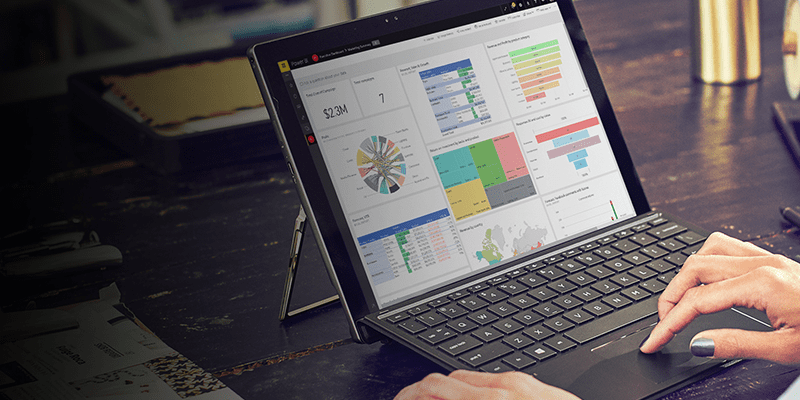The transformative changes in Oracle EPM's next-gen reporting, driven by the Oracle Enterprise Performance Reporting Cloud Service. Discover how businesses benefit from user-friendly interfaces, enhanced decision-making, and cost savings. Learn about the seamless migration process and the promising future of EPM reporting in this dynamic digital landscape.
In today's fast-paced and data-driven business landscape, keeping up with the latest technologies and advancements is essential for maintaining a competitive edge. In the realm of Enterprise Performance Management (EPM) reporting, Oracle has undergone a remarkable transformation, ushering in changes that are not only substantial but also revolutionary.
However, this transformation doesn't come without its share of challenges. Businesses often grapple with complex data structures, integration hurdles, and the need to make sense of vast amounts of information. Adapting to new reporting tools and technologies can be a daunting task, requiring training and a shift in organizational processes.
Whether you're a part of an organization that depends on Oracle consulting Services solutions or simply have an interest in staying updated on the latest developments in enterprise reporting technology, then this information is what you might be looking for. It offers insight into the continuously evolving realm of Oracle EPM reporting and explores the advancements, adaptations, and next generation reporting tools that are making a substantial impact on businesses in today's dynamic landscape.
The Oracle EPM Evolution
Oracle boasts a rich legacy as a prominent figure in the EPM software sector. Over the years, their comprehensive array of tools and solutions has played a pivotal role in assisting numerous organizations in optimizing their financial planning, performance management, and reporting procedures. Nevertheless, in an era marked by swift technological progress, adaptation becomes imperative. Oracle, cognizant of this need, embarked on a path of transformation and innovation, resulting in the emergence of the next-generation Oracle EPM reporting solutions.
These modern solutions represent a pivotal shift in how businesses approach enterprise performance management. They encompass innovative technologies and methodologies, providing organizations with a competitive edge in an ever-evolving landscape. Oracle's commitment to staying at the forefront of EPM technology ensures that businesses can continue to leverage their expertise and solutions to drive success in an increasingly dynamic and data-centric world.
Oracle Enterprise Performance Reporting Cloud Service
Oracle Enterprise Performance Reporting Cloud Service (EPRCS) stands as a groundbreaking advancement in the realm of Oracle EPM reporting, bearing substantial implications for businesses seeking to enhance their reporting processes. As organizations continue to grapple with the complexity of performance reporting, EPRCS offers a transformative solution.
At its core, Enterprise Application Services are a cloud-based platform designed to streamline and revolutionize performance reporting. It represents a significant departure from traditional, on-premises reporting systems. What sets EPRCS apart are its key attributes: convenience, accessibility, and efficiency.
- Convenience: EPRCS enables organizations to move away from the time-consuming and error-prone manual processes that often plague performance reporting. By providing a unified platform that integrates data collection, report generation, collaboration, and distribution, EPRCS simplifies the entire reporting workflow. Users can easily create, manage, and update reports in a user-friendly environment.
- Accessibility: Being cloud-based, EPRCS offers unparalleled accessibility. Users can access the platform from anywhere with an internet connection. This feature is especially crucial in today's business landscape, where remote work and distributed teams are increasingly prevalent. It ensures that stakeholders have access to real-time data and reports, fostering faster decision-making and better-informed choices.
- Efficiency: EPRCS streamlines the reporting process by automating various tasks. It reduces the risk of errors, minimizes the time and effort required to produce reports, and ensures data accuracy. Moreover, its ability to consolidate data from various sources simplifies the task of creating comprehensive, insightful reports.
Incorporating EPRCS into your EPM strategy offers businesses numerous advantages. It empowers them to meet reporting requirements more efficiently, respond to changing conditions promptly, and maintain data integrity. This cloud-based solution is well-suited for organizations looking to enhance their competitiveness in an increasingly data-centric and dynamic business environment. Moreover, it provides a foundation for leveraging advanced reporting features, predictive analytics, and data-driven decision-making, positioning businesses for long-term success in the ever-evolving business landscape.
Benefits of Oracle EPRCS
- User-Friendly Interface: The new reporting cloud service comes equipped with a drag-and-drop interface, simplifying the process of designing and editing reports. This user-friendly approach significantly reduces the learning curve for users, enabling them to create reports more efficiently.
- Report Bundling: Reports can now be bundled into "Books." This feature is especially useful for organizations dealing with a large volume of reports. It simplifies organization and access, ensuring that reports are easily navigable.
- Report Bursting: One of the standout features is report bursting. It allows you to run a report or book for multiple members of a single dimension from a single data source. This capability is a game-changer when it comes to generating customized reports for different stakeholders.
- New Charts: The next-gen Oracle EPM reporting tools introduce various new chart types, such as waterfall, doughnut, scatter, and bubble charts. These charts provide a more comprehensive and visually engaging representation of your data.
- User Interaction Features: Oracle has taken user interaction to the next level with selectable alias tables, member label display, and an ad-hoc zoom mode. These features empower users to interact with their data and reports more dynamically.
- Narration Enhancement: Intelligent Narrative Generation is now available, bringing an entirely new dimension to your reports. It enables the system to generate insightful narratives about your data, making it easier for users to understand the context and insights behind the numbers.
Migrating From Legacy EPM Reporting
If your organization is currently using Oracle's legacy EPM reporting system and you're concerned about the transition, there's good news. Oracle has made it possible for users to migrate their existing reports seamlessly. You can perform an in-place migration in the same instance, and you have the flexibility to choose whether to migrate all reports at once or select individual reports for migration.
However, it's important to note that not all elements of your old reports will migrate automatically. Any errors that may arise during the migration process will be presented to you in a clear and understandable manner. This user-centric approach ensures that you are aware of any issues and can take necessary actions to resolve them.
The Business Impact
Beyond the technical aspects, the adoption of next generation reporting tools carries a substantial impact on organizations. These transformative changes usher in a new era of efficiency and productivity, as user-friendly interfaces and streamlined report creation liberate teams from the burden of arduous report generation, enabling them to concentrate on analytical insights and well-informed decision-making.
The introduction of innovative chart types, interactive features, and intelligent narrative generation enhances the quality of decision-making, ultimately facilitating adaptability in competitive markets. The transition to cloud-based systems ensures an elevated user experience, with a positive interface and interactive features, which may translate into higher user adoption rates.
Accessible from anywhere, cloud-based reporting further fosters collaboration among teams, making it a strategic asset for organizations with remote or geographically dispersed teams. In sum, the business impact of these technological strides is nothing short of a transformation, promising enhanced efficiency, data-driven decision-making, and overall agility in the competitive landscape.
Conclusion: Looking Ahead
As we reflect on the changes and innovations in Oracle EPM reporting, it's essential to keep an eye on the future. So, what's next for Oracle EPM reporting? While we can't predict the future with certainty, it's reasonable to expect continued improvements in usability, data analysis, and integration with other business systems. The focus will likely remain on delivering a seamless and intuitive user experience while harnessing the power of data to drive better business outcomes.
In conclusion, the changes in Oracle EPM's next-gen reporting are not just about embracing new technology; they're about redefining how organizations manage and utilize their data. The Oracle Enterprise Performance Reporting Cloud Service is a testament to Oracle's dedication to providing powerful and user-friendly EPM solutions that empower businesses to thrive in today's data-driven world.
The impact on business efficiency, decision-making, and user experience is undeniable, making the transition to next gen reporting a strategic move for organizations looking to stay competitive and agile. As Oracle EPM reporting continues to evolve, so will the possibilities for businesses to unlock new insights and drive success.
Nonetheless, the Oracle Enterprise Performance Reporting Cloud Service is a testament to Oracle's dedication to providing powerful and user-friendly EPM solutions that empower businesses to thrive in today's data-driven world.
The impact on business efficiency, decision-making, and user experience is undeniable, making the transition to next gen reporting a strategic move for organizations looking to stay competitive and agile. As Oracle EPM reporting continues to evolve, so will the possibilities for businesses to unlock new insights and drive success.





